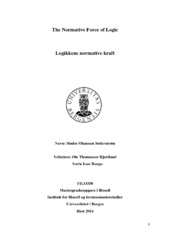The Normative force of logic. Logikkens normative kraft
Master thesis
Permanent lenke
https://hdl.handle.net/1956/15580Utgivelsesdato
2016-11-21Metadata
Vis full innførselSamlinger
- Department of Philosophy [240]
Sammendrag
Logic and reasoning appear to be closely connected. What the exact relationship is might be contentious, but that such a relationship exists seems uncontroversial. Gilbert Harman, however, has argued in a number of texts that there is in fact no such special connection between logic and reasoning. This in turn has resulted in attempts to recover logic's central role in our reasoning. The key behind such a recovery consists in designing a so called bridge principle. That is a principle connecting facts about logical consequence with normative claims about belief states. The two central characters behind this project are John MacFarlane and Hartry Field. I will argue, in agreement with Field, that we are in fact close to producing such a bridge principle, but I want to claim that this in itself is not sufficient to give an adequate answer to Harman's critique. The existence of a bridge principle does not establish a special connection. This rests on the claim that even though one can answer Harman's particular objections, it is not enough to answer what I take to be the underlying motivation behind the objections. The result is the following claim: That logic is relevant for reasoning does not guarantee it a special status. I will give an interpretation of what Harman demands for logic to have a special connection to reasoning. My thesis will culminate in what I take to be a better candidate for what could establish such a special connection. Logic has to give us epistemic norms whose normative force isn't simply inherited from norms about truth. It has to provide norms that we wish to follow irrespective of their ability to increase our accuracy. I will argue that there are no good reasons for expecting logic to give us this. Logic is normative simply because truth is.
